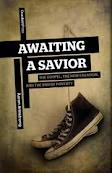Book Recommendation:

October 17, 2011
 Awaiting a Savior, Aaron Armstrong (CruciformPress, 2011)
This is Cruciform’s book for October, and definitely one of my favorites from them so far. The subtitle, The Gospel, the New Creation and the End of Poverty, is a bit of a hot topic in the whole study of Christ and culture right now. I really loved the way that Armstrong handled this sensitive and passionate topic. This is a man who is passionate about helping the poor, but he has a much deeper understanding of the real problem than most philanthropists, politicians, or pop stars for the cause. Here are several good excerpts:
Awaiting a Savior, Aaron Armstrong (CruciformPress, 2011)
This is Cruciform’s book for October, and definitely one of my favorites from them so far. The subtitle, The Gospel, the New Creation and the End of Poverty, is a bit of a hot topic in the whole study of Christ and culture right now. I really loved the way that Armstrong handled this sensitive and passionate topic. This is a man who is passionate about helping the poor, but he has a much deeper understanding of the real problem than most philanthropists, politicians, or pop stars for the cause. Here are several good excerpts:
People who study poverty today have a hard job. First, you must define what poverty is. How poor is poor? There are many levels of poverty, and poverty in North America can look very different, for example, from poverty in West Africa. Then you must consider a huge number of factors to try to figure out what mix of things is really “causing” poverty. But if you are one of these researchers, you may have an even bigger obstacle before you. If you don’t understand what happened in the Garden of Eden, you are missing the single biggest factor that contributes to poverty. You are blind to the fundamental, underlying cause. You see lots of branches, but you don’t realize they all connect to a root. You can recognize many symptoms, but you end up imagining that the symptoms are the disease itself (21)… This is poverty in its most true and ultimate sense. Incomparable riches—an unbroken relationship with God and a harmonious relationship with the rest of creation—have been squandered. Everything about our existence has been impoverished as a result of sin. A fallen world inhabited exclusively by sinners: that is the essence of poverty. Sin, and the effects of sin throughout creation, is the Poverty from which all other poverty flows (23).As horrible as material poverty is, Armstrong points us to the cause which is much more horrific. He then brings us to the gospel message, and true generosity. Anything else is legalism. Christians should be very generous, but we also know that poverty will remain until our Lord returns. We hope in something much bigger from the fruit of our works through Christ. Armstrong puts it like this:
We care for the poor because we know what it feels like to be on the receiving end of grace. We were the poor in spirit. We were lost and without hope. We were separated from God and enslaved to sin. But “God so loved the world, that he gave his only Son, that whoever believes in him should not perish but have eternal life” (68)… But generosity is about much more than money. As a Christian, your entire life is supposed to be an act of generosity—a life invested in, spent for, and used up to the glory of God and the good of others (88).I loved this book. It was both convicting and encouraging. Most of all, it points us to that glorious day when those called by the Lord will enjoy eternity with him in a new heavens and a new earth, with no sin in his perfect economy of grace and justice. All praise be to God!




